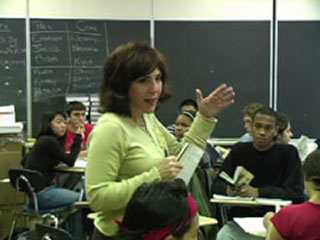Simply stated, I teach to “tikkun
olam” or heal the world. I do not teach to earn a profit
for some nameless investors; (despite the incursion of for profit
companies into the public school arena) I do not teach to get
the most privileged kids into the best schools; (despite the
assumptions and demands made by some of the parents) I do not
teach to pass on unexamined traditions of literature or history;
I do not teach to perpetuate racism, sexism, classism, ethnocentricism,
heterosexism, nor any of the other damaging isms that threaten
to diminish the lives of some and aggrandize the lives of others.
I do not teach to maintain the status quo.
For me teaching is
a hopeful act, one of possibility and transformation. And it
has been a struggle. The struggle became more difficult for me
in a school of relative privilege. It wasn’t just
that the playwriting program didn’t fit; my own philosophies
and values appeared to be in conflict with the dominant values
of the school at large.
With the support of The Carnegie Academy
for the Scholarship of Teaching and Learning (CASTL) I began
to explore alternative approaches to what I was doing in my English
classes at Masterman. With the assistance of CASTL I
was able to develop an interactive website entitled “Playing
With The Possible: Teaching, Learning
and Drama on the Second Stage." On
that website, and for my Carnegie project, I was able to 1) outline
my process and history as a teacher researcher, 2) present my
thinking behind the development of a new elective class called
Drama and Inquiry and 3) explain my burgeoning theory of “second
stage” school reform that I thought might be possible at
a school like Masterman.
Many theatres have two performance areas:
a main stage upon which works are performed with a wide audience
appeal and a second stage, sometimes called a black box where
new plays and experimental works can be developed. The second
stage often serves as an incubator for main stage productions. In
rethinking my approach to my teaching at Masterman, I developed
an elective class called Drama and Inquiry that grew out of my
decade long association with Philadelphia Young Playwrights and
consistent with my critical pedagogy approach to teaching and
learning. While my English classes (represented in this website)
remained “main
stage” productions,
my elective became the alternative, experimental space- my second
stage on which I could enact a different kind of pedagogy that
might eventually have an impact on the pedagogy of the main stage.
...
I also read the work of Brain Edmiston (2000), one of the leading
researchers in Drama Education. I was intrigued by his ideas
about drama as a form of ethical education that could provide
students with multiple and sometimes conflicting views of events.
He writes, “to judge myself ethically, I must be answerable
to others’ evaluations of my actions at the same time I
expect them to be answerable to me and to others” (p 66). Reflection
on action is essential to acting ethically and one must get outside
of his own intentions to view his actions from the perspective
of those affected. He goes on to argue that drama enables young
people to imagine life from other people’s positions. Such
positioning offers them the opportunity to imagine “how
the world could be different and what our lives could be like
if we acted in different ways” (p. 67).
